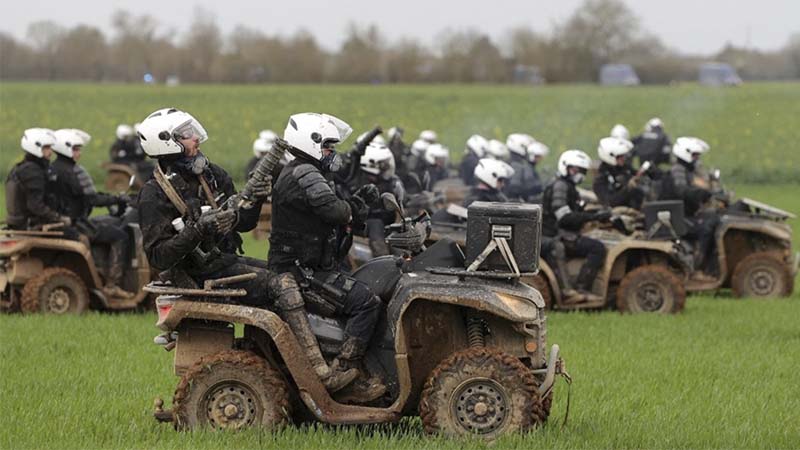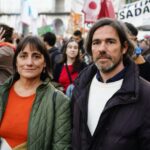
This Saturday, a massive environmental protest took place in Sainte Soline, in west-central France, to protest against the construction of agricultural dams and defend the water cycle.
The mobilization was called by the collective “Bassines non merci” to protest against agricultural dams. Organizations such as Soulèvements de la Terre (ecological organization) and the Confédération Paysanne (agricultural union) joined the call, as well as more than a hundred political, trade union and environmental organizations. The massiveness of the mobilization shows an important new stage in the fight against this type of installations that seek to collect water by pumping, with the aim of ensuring this priority resource for large farms, regardless of the damage to small farmers and regeneration of the water table, which allow a global balance of the soil and a long-term stability of resources and needs.
[DIRECT] MASSIVE mobilization against #megabassines To #SainteSoline : several tens of thousands of people gathered in several processions despite the ban! pic.twitter.com/XiafvAEw1a
— Permanent Revolution (@RevPermanente) March 25, 2023
The State has increased the level of violence against protesters, from what was deployed this Saturday. 3,200 police officers were deployed in the area, circulation between two municipalities was prohibited. A week before, a spokesperson for the activists was arrested, two helicopters were deployed to monitor the area, the police drove quadricycles to chase the protesters and fire tear gas grenades and rubber bullets at them… The previous concentration against the reservoirs had already been severely repressed. at the end of October and now the repression was more brutal.
This massive repressive device was unloaded throughout the day, covering the procession under a cloud of gases, explosive grenades and rubber bullets, seriously injuring numerous demonstrators.
A motorcyclist blindly fired at the LBD on anti-basins demonstrators in Sainte-Soline.#greve28mars #BassinesNonMerci #DeuxSèvres #SainteSoline #manifestation #ViolencesPolicieres #DarmaninDemission #BravM #megabassines pic.twitter.com/lshz0ybRVx
— La Luciole – Media (@laluciolemedia) March 25, 2023
According to a statement from Soulèvements de la Terre, more than 200 protesters have been injured by the police, a still provisional count. One of these has been induced into a coma and his life is at risk. Two others remain in critical condition. A dozen seriously injured are in the hospital and another forty suffer deep injuries (largely due to police grenades). Le Media reported that a protester has lost an eye.
“The level of repression was incredible. Around me, people said that it was like when the Yellow Vests, or the mobilizations against the closure of Sivens (in which the young Remi Fraisse was killed by a grenade thrown by the police), to find such a level of repression”, he explained. a protester. “A group managed to reach the site of the reservoir, but the demonstration finally had to back down because the doctors ran out of material to treat the wounded. In addition to the fact that the police blocked the emergency services,” added the protester.
In addition to this cruelty, the police prevented the health services from assisting the critically injured for several tens of minutes: “the health services commented to a doctor who called them, in a conversation in which the lawyers of the Ligue des Droits de l’Homme (LDH) were present, that the police chiefs gave orders to prevent them from going to the place,” they explained from that organization on Twitter. The forces of repression were merciless with the wounded, throwing grenades in their direction, as the general secretary of the Greens (EELV) Marine Tondelier later denounced in the media.
These facts dismantle the lies launched by the government to justify the. In a public statement, Gérald Darmanin, the French interior minister, stated that: “the gendarmes participated in the evacuation of wounded demonstrators and were in turn attacked by the most radical elements of the mobilization, preventing relief operations and making it difficult for doctors on the spot. I want to denounce these deplorable facts”. An attempt to sell a good image about events that occurred as the police usually do. The latter goes hand in hand with purposely minimizing the number of people injured by the forces of repression, accounting for only seven.
Continuing with the lie, and relying on images of police vans on fire and demonstrators confronting the police that are shown in a loop on television, Darmanin condemned: “the violence unleashed (…) absolutely inexcusable, consciously organized by small groups of the extreme left .” An argument reminiscent of the term “eco-terrorism” that he used in October to criminalize opponents of agricultural dams and justify their repression.
He has taken the opportunity to call for the entire political caste to take a position against violence: “I solemnly ask all the political representatives, elected officials of the country, whatever their police position, whether or not they are in favor of the pension reform, or against the agricultural reservoirs (…) to condemn this enormous violence against the security forces of the Republic.” A call that was quickly joined by, for example, Eric Ciotti, president of the Republicans.
An attempt to rely on a government story built around Sainte-Soline to convene around the government, isolated as ever, a “republican front” against the radicalism of the protesters. An attempt, moreover, to turn the people against the violence in the demonstrations now that radical mobilizations arise spontaneously in many cities against the pension reform.
Until now, 62% of the population supports a radicalization of the mobilization against the pension reform and 70% attributes the responsibility for the current violence to the government. This dynamic causes panic in the government, which seeks to break it by all means.
This repressive deployment against the Sainte Soline demonstrators as well as Darmanin’s statements are a new sign of the weakness and isolation of a government in the face of a movement of large protests. A repressive bet against which must be confronted with the greatest possible solidarity, both with the protesters of Sainte Soline and with workers and youth repressed in the inter-union or spontaneous demonstrations or with the strikers “requisitioned” by the police. From this point of view, the silence of the inter-union about the current repression is a serious scandal: all the means of the union centrals should be at the service of solidarity against the repression, essential to consolidate the movement and expand the strike.
From Révolution Permanente and the Network for the General Strike, they call for coordinated actions against police repression.
Source: www.laizquierdadiario.com

